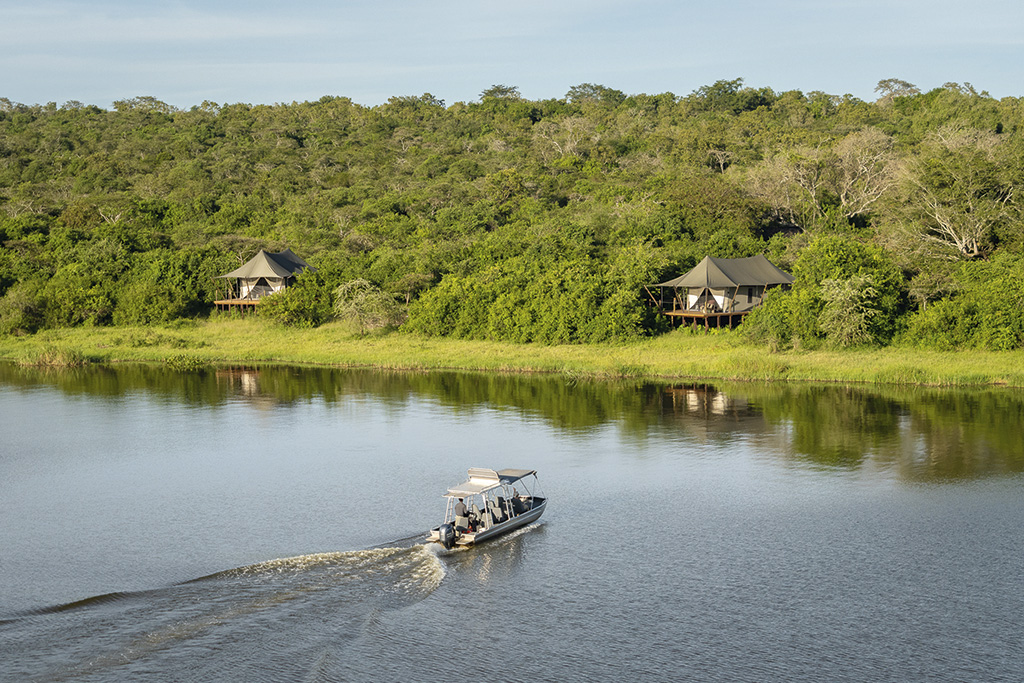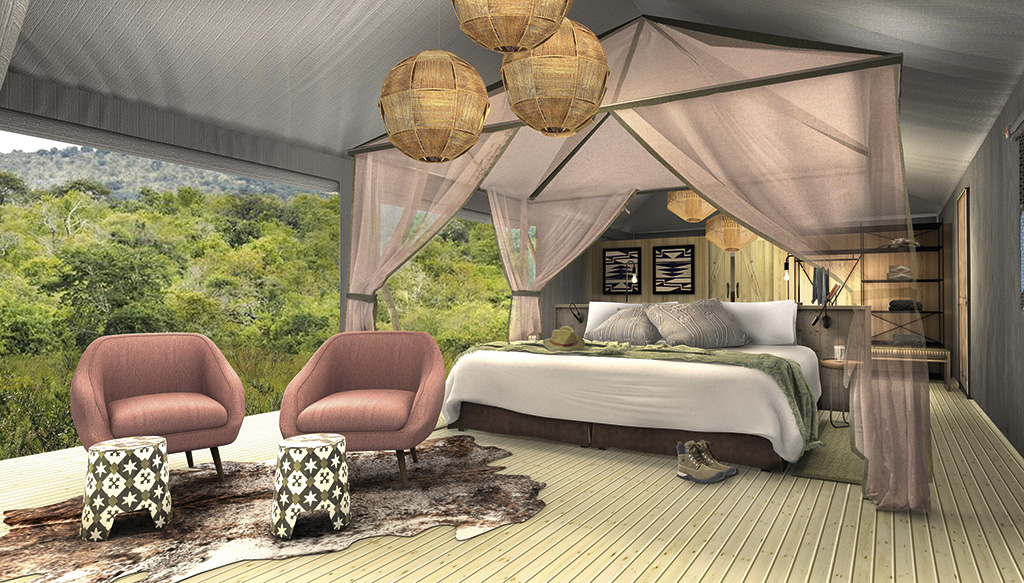Rwanda is, for many, the land of the two Gs – genocide and gorillas. The genocide will remain an indelible stain on the country’s history. A return visit in May, though, demonstrated that, 25 years on, there has been remarkable progress towards national unity. Tourism is the main foreign exchange earner, and the gorillas remain a primary reason to visit the Land of a Thousand Hills.
The Rwandan authorities know they must diversify the visitor experience and are hungry for partnerships with international investors with tourism experience. Wilderness Safaris has been one of the first out of the blocks. (Singita is also entering the Rwandan market.)

A boat trip delivers guests to Magashi on the final leg of their journey to the lodge.
Wilderness Safaris runs a highly successful lodge, Bisate, just outside Volcanoes National Park, which serves as a base for gorilla and golden monkey tracking, hiking up the three volcanoes after which the park is named, or exploring the Musanze Caves. Its latest property is Magashi Camp in Akagera National Park, which borders Tanzania in the east.
It was my second visit to the park, and the cliché ‘chalk and cheese’ is irresistible. In 2005 Akagera was still suffering from the aftermath of the mass occupation of the park by many thousands of returning refugees who had fled the genocide. They’d cleared large areas for agriculture and cattle husbandry, poached many of the herbivore species to near local extinction, and wiped out the lion and black rhino populations entirely. In two days, I saw no more than a dozen animals.

Restrained luxury at Magashi Camp, nestled right into the landscape; a priceless location, wedged between lake and forest. Image: supplied.
The turnaround began in 2010 when the Rwandan Development Board signed an agreement with African Parks to manage Akagera. A combination of intense anti-poaching security and a re-stocking programme has meant a recovery to pre-genocide levels of most animal species. Lion numbers have gone from zero in 2015 to at least 24, and 23 black rhinos have been reintroduced in the last two years. Akagera is a truly beautiful park with a wide variety of habitats represented in its 100 000 hectares – savannah, riparian forest, montane grassland, mixed woodland and five magnificent lakes.
Magashi is situated on a private concession in the north-west of Akagera, with six luxury tents all fronting onto the endless vista of Lake Rwanyakazinga. Wilderness Safaris is a past master at this kind of safari operation, and the tents and communal areas have an understated, blend-into-the-environment level of luxury without ostentation. You want for nothing; there’s always a smiling face close by to anticipate and fulfil every need and desire. The days pass in the time-honoured tradition of an African safari – a morning game drive followed by lazy resting in the middle of the day, and then an afternoon drive that segues through scenic sundowners into a night drive back to camp. And always there is food, lots of it, and all of it just too tasty to decline.
Magashi also offers boat-based outings, giving guests another view of the land-based animals and close-ups of the biggest Nile crocodiles I’ve ever seen. Don’t expect the huge herds of ungulates and elephants that you can see in East and Southern Africa, but it’s a Big Five reserve and there are good numbers of plains game. We saw lions, leopards and hyenas hunting, and had daily views of a pride of 14 lions, including two four-strong litters of playful and curious cubs. I identified close to 180 different birds out of a park list of more than 500 – not bad for three days of largely desultory binocular-lifting. It was a wonderfully uplifting visit. Forgive the rather tortured metaphor, but I flew out of Kigali thinking of Rwanda as a five G country – adding genuine, giving and gorgeous to the list.

Zebras and giraffes and the endless vista of the Kilala Plain
Best Feature
The exquisite setting – always, always, there is a beautiful view and a spectacular skyline.
Cost From R6 ,660 per person sharing fully inclusive (low season is 16 October to 15 December). Bonus: three nights at Magashi between November and May qualify you for a 30 per cent discount on a gorilla permit.
Contact 011-257-5000, wilderness-safaris.com

Large Nile crocodiles bask on the edges of Lake Rwanyakazinga.
Also new in Rwanda
Wilderness Safaris is setting up another lodge in Rwanda’s newest national park, Gishwati-Mukura, where chimpanzee tracking will be the major attraction. The Congo Nile Trail is 227 kilometres of breathtaking scenery skirting Lake Kivu in the west, which can either be hiked or cycled. The tourism authorities are looking at establishing an adventure-tourism centre (bungee jumping, paragliding and the like) around Rusumo Falls in south-east Rwanda.
Words and images: John Maytham
You may also like
Related Posts
Gabrielle Jacobs forsakes the Breede Valley’s winelands for some Cape nature at Vrolijkheid Nature Reserve,15km...
read more